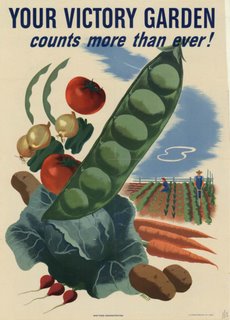 The world was at war. Resources of all kinds were being diverted to support national war efforts. Countries asked their citizens to help in every way that they could.
The world was at war. Resources of all kinds were being diverted to support national war efforts. Countries asked their citizens to help in every way that they could.People dutifully funded the war by purchasing bonds, they conserved raw materials, they recycled, they rallied behind the troops, they helped their neighbors, they gave their lives, and they planted "Gardens for Victory". These gardens produced up to 40% of all that was consumed.
Victory Gardens came in every shape and size. Governments and corporations promoted this call for self-reliance. People in all areas, rural and urban alike, worked the soil to raise food for their families, friends, and neighbors. Victory gardening enabled more supplies to be shipped to our troops around the world.
Many of the public service booklets taught the basics of gardening. The audience was assumed as having no knowledge and the material was presented as such. Topics included soil health, how to plant, when to plant, how to tend plants, pest identification, and even suggestions on what to plant. Emphasis was placed on making gardening a family or community effort - not a drudgery, but a pastime, and a national duty.
Agriculture quickly changed. Small farm operations began to give way to large corporate farms. Mechanization and petrochemicals replaced time proven tillage methods. This led to crop standardization and eventually genetic engineering of plants. This has since been the face of "modern" agriculture. There are fundamental changes occurring in agriculture today. More people are taking an active interest in the quality of the food that they take into their bodies. More people are producing a portion of their food for fun and sustenance. And there is a rise in the number of small farms answering the call to produce high quality, organically produced food products.
These concepts are very foreign to us in our post-war, global economy. For years we have been bombarded by marketing messages of consumerism, reliance on others, and have experienced nearly constant economic growth. A whole generation of young people know it no other way. History is cyclical, the strong economy of the 1980s and 1990s has begun to weaken, and there are lessons to be learned from the past. No matter how you think the future will unfold, it is certain that it will include change. If times stay good, that is great. That is what we are all praying for. If times get tough, a little insurance is always nice. A form of insurance is the ability to provide for yourself and your family -- having the knowledge to produce and preserve your own food is an investment vehicle in its purest form. It is always a good time to plant your own "Victory Garden".
"No unemployment insurance can be compared to an alliance between man and a plot of land."
Henry Ford (e o meu avô dizia o mesmo...)






Sem comentários:
Enviar um comentário